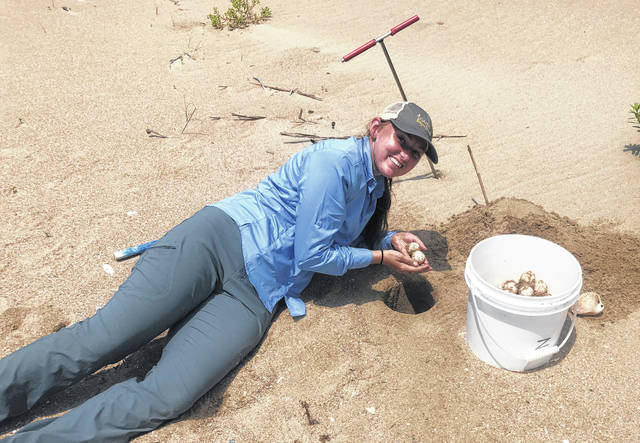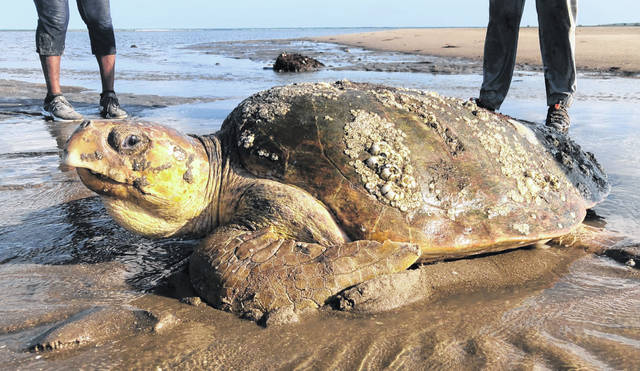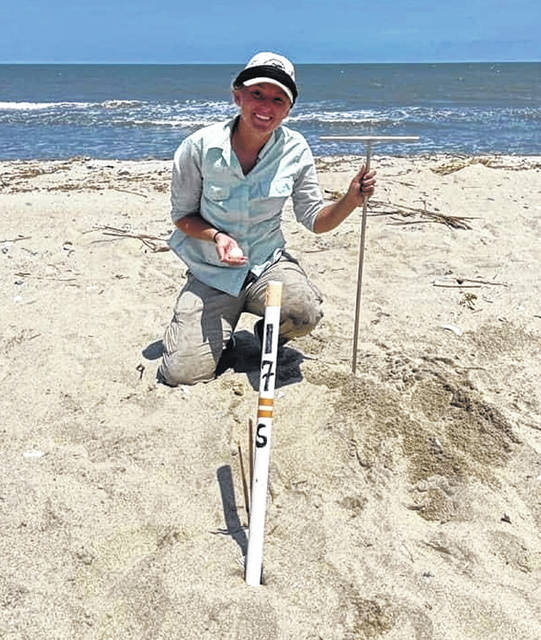


WILMINGTON — Summer 2021 for Heidi Edens involves the ritual of driving an all-terrain vehicle along a South Carolina beach as the sun rises over the Atlantic Ocean.
That evokes images of a Beach Boys’ song or the opening scene to a surfing film, but just as exciting for the Wilmington College senior is her mission to discover fresh turtle tracks in the sand.
Loggerhead turtles typically come ashore at night to build a nest in the sand — near where the mother turtle was hatched decades earlier — and lay as many as 140 ping-pong ball size eggs before returning to the sea by daybreak.
Rain, wind and human footprints quickly cover evidence of the turtles’ brief land excursion, so Edens is out “bright and early” at day’s first light.
Edens is a senior from Middletown majoring in animal science and communication arts with a minor in biology.
She and the other interns working in the Loggerhead Sea Turtle Nesting program at the Cape Romain Wildlife Refuge in Coastal South Carolina regularly check stretches of beaches for the tell-tale tracks of 300-pound loggerheads.
Once a suspected nest site is discovered, they dig in the sand to confirm the location of the eggs and evaluate whether the nest is in a safe location — safe from wave and tidal erosion.
Otherwise, they fill buckets with the eggs — very carefully because simply rotating an egg can detach the embryo — and translocate them a safer area.
Some 140 eggs might seem exorbitant, but Mother Nature is wise. The odds are stacked against turtle hatchlings making it safely to their ultimate ocean home, let alone surviving to become three-feet long, 300 pounds, reaching sexual maturity in 30 years and living to the grand old age of 70 as the world’s largest hard-shelled turtles.
Indeed, Edens noted, even before they’ve hatched from eggs, perils abound with seagulls and other shore birds, along with coyote, raccoon, mink and crab, always on the prowl for such dining delicacies as turtle eggs.
Once they hatch, most intuitively go to the sea, but coastal lighting, housing and commercial development, marshes and other intercoastal waters can confuse their senses.
“It’s a hard life for turtle hatchlings, not a whole lot of success,” Edens said, adding that 60 hatchlings recently went the wrong way and died. “Even when turtles make it to the ocean, there’s a whole another group of predators there. It’s a hard life.
“That’s why our work is so important.”
Love for conservation
Edens, who went through a phase when she was younger wishing to become a marine biologist, has maintained a love for wildlife and conservation. She had a “gut feeling” that her original summer plans were not in her destiny, so she applied for the internship, successfully interviewed and, four days after accepting the job, she was in South Carolina.
Working with sea turtles is only one part of her summer employment. Two days a week, Edens works with seabirds and shorebirds through the South Carolina Department of Natural Resources.
Like the turtles, many shorebirds’ nesting habitat is threatened by urbanization. She also conducts kayak and paddleboard tours around Charleston, provides nature interpretation for ferry trips to Bull Island and works with the U.S. Division of Fish and Wildlife by writing on social media about various local species, some of them threatened or endangered.
An early summer post featured the shorebird known as Wilson’s plover.
“Driving an ATV alone on the beach first thing in the morning is so amazing — I can’t believe I get paid to do this,” she said. “I’m very thankful for this opportunity. I keep telling myself, ‘This is real!’ I’ve loved every single second of this summer.
“It’s pretty much the coolest job in the world!”
Soccer and much more at WC
Even though her summer of a lifetime continues through the middle of August, Edens is quite aware of her rapidly approaching senior year. She is training for the women’s soccer team’s fall season by regularly running the pedestrian-friendly, 2.5-mile Arthur Ravenel Jr. Bridge, which spans between Mount Pleasant and downtown Charleston.
The opportunity to play collegiate soccer was a “bonus” for Edens when her plans to study agriculture shifted from attending the state’s largest university to the personal-sized Wilmington College, where hands-on learning opportunities — like unique internships — abound.
“One I visited WC, I said, ‘This is where I’m spending the next four years.’ The puzzle pieces fit into the right spots, kind of like this summer where everything worked out,” she said.
Edens added that with everyone she works with knowing she comes from Ohio, where crops and livestock and their related services are the focus of most agriculture majors at WC, they ask how this summer’s experience with turtles, shorebirds, kayaks and living next to a boat launch will enhance her ultimate career plans.
“I tell them it will have a huge impact on living my best life,” she said.
Randy Sarvis is the senior director of public relations at Wilmington College.




